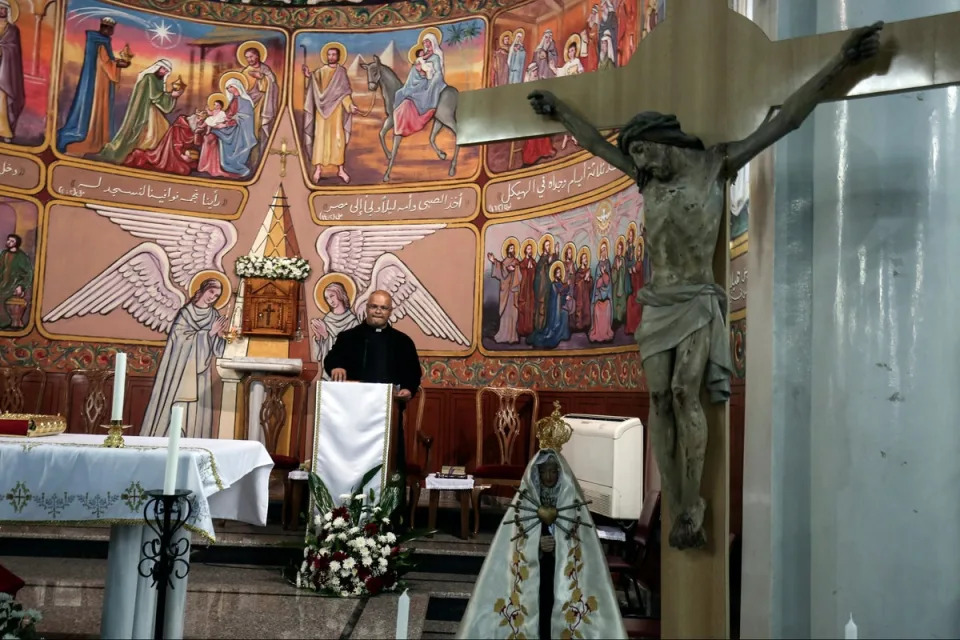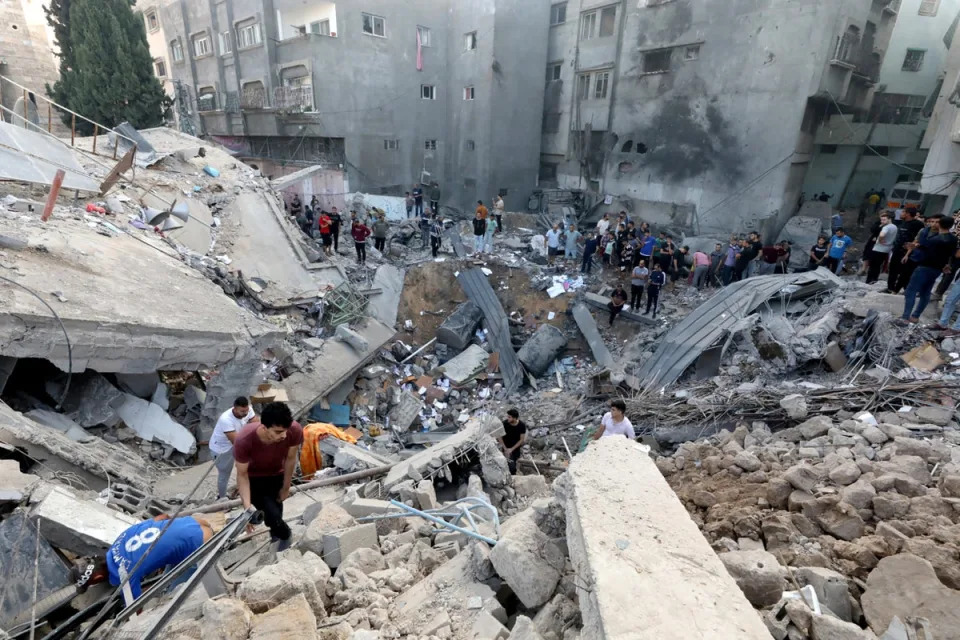How a sniper’s bullets utterly shattered the last vestiges of sanctuary in Gaza’s only Catholic church
Bel Trew
Wed, 20 December 2023

Nahida Anton (left) and her daughter Samar were shot in the courtyard of the Holy Family Church in Gaza City (Supplied/Getty)
For years, Gaza’s only Catholic church had been a sanctuary of prayer for its congregation, so little wonder it was where hundreds would flee after the destruction of homes in the territory’s largest city, the focal point of Israel’s ferocious aerial bombardment.
The parishioners turned nursery playrooms and even pews in the nave of the sprawling complex of the Holy Family Church into makeshift homes. They held Mass by torchlight, praying for survival as Israel’s bombing campaign levelled buildings in the area around them.
Israeli tanks closed in and snipers positioned themselves on the apartment blocks overlooking the compound, making moving between the buildings of the limestone complex dangerous.
Samar Anton, 49 a Gaza City church worker, knew there was a risk in helping her mother Nahida, a grandmother in her seventies who was weak from two months of war and little food, to the bathroom.
It required crossing a palm-tree-lined courtyard that in any other year a week before Christmas would have been crowned with a towering tree and packed with children singing Christmas songs.
Now it was exposed.
A sniper bullet cracked through the air and into Samar’s head. Another hit Nahida, a grandmother of 15, in the stomach.

Some of the damage around the Holy Family (Latin Patriarchate of Jerusalem)
“Their family saw them drop to the floor,” says George, 31, who is related to the women but has asked for his identity to be protected, as he fears for the safety of his family and for himself. Blood stained the floor.
Speaking to The Independent from the occupied West Bank, he says his parents and his 20-year-old brother, like most of Gaza’s dwindling Christian population, have been sheltering in this church in northern Gaza, and the Orthodox Church about two miles east.
His family told him the story of the killings – which have sparked global uproar, described by Pope Francis as “terrorism” – during rare phone calls as the signal faded in and out. The Latin Patriarchate of Jerusalem – the Catholic authority in the region – said that Nahida and Samar were killed “in cold blood”.
“Some of our relatives rushed out to help. One of them was a surgeon called Dr Elias, the others were my family members including a cousin, who is just 16 years old. But they were then hit by a kind of bomb.
“Seven in total were injured from shrapnel – including my teenage cousins. There is no way to properly treat them there are no working hospitals in north Gaza.”
George, who had already lost 20 members of his family in Gaza, has now lost contact with his parents and the others in the church. He doesn’t know if they have been able to bury the bodies, or if the injured are still alive. All he knows is there is “no hope”.
“All our homes have been bombed. Gaza is uninhabitable, dead bodies are everywhere, epidemics are taking over, the craters from the bombing are 20 metres deep. There is nothing left.
“We are very worried if we cannot get them out.”
Those trapped had already been forced into rationing out the last scraps of oatmeal and dwindling, dirty water, unable to move.

The Holy Family Church before the latest conflict (AFP/Getty)
The bombardment of Gaza began in the wake of the 7 October attack inside Israel by Hamas, during which 1,200 people were killed and 240 people taken hostage. In the near-constant aerial assault that has followed, health officials in Gaza say Israel’s offensive has killed more than 19,000 people, nearly three-quarters of them women and children. Vast swathes of the 26-mile-long strip, which is home to more than two million people, have been levelled in Israel’s bid to eradicate Hamas.
One of the chief focuses of Israel’s campaign has been Gaza City, where forces have encircled hospitals schools and now, apparently, churches.
An Israeli Foreign Ministry spokesperson said the incidents at the church which took place on Saturday were still under review.
The Israeli military appeared to deny the report, saying that “it targets terrorists and terror infrastructure and does not target civilians, no matter their religion”.
But the killing of the two women in the church, as well as the bombing and the siege on the compound, has cast a searing spotlight on the Israeli military’s use of force. George says there are real fears Gaza’s Christian community will be on the verge of “extinction” if such attacks continue.
Layla Moran, a Liberal Democrat MP, has family trapped in the Catholic church, including a grandmother, a cousin, his wife and their 11-year-old twins. She says the congregation are “innocent civilians who had nothing to do with Hamas and [are] absolutely terrified”.
In recent days she said, anyone who approached the church had been shot.
“I have been told white phosphorus was thrown into the compound, that the bin collector was shot dead as he tried to come into the compound, and that a janitor trying to fix a carpet was also shot,” she tells The Independent. White phosphorus is an incendiary, used to create light and smokescreens during combat. Using it isn’t illegal but deploying it deliberately against civilians or in a civilian setting violates the rules of war. Israel says it complies with international law over its use.

‘My family is not justifiable collateral damage’: Liberal Democrat MP Layla Moran (PA)
Ms Moran said the congregation were “innocent civilians who had nothing to do with Hamas and [are] absolutely terrified”.
She urged the Israeli military surrounding the church in tanks to “back off” immediately.
“We need to exert maximum pressure on Israel and Hamas for that bilateral ceasefire. There is no military solution to this. My family is not justifiable collateral damage.”
Ms Moran says that the remaining generators have been destroyed in the bombardment, meaning there is no power.
The church’s solar panels had also been destroyed, water tanks had holes from shrapnel and gunfire, and the only source of electricity, one last generator, was also blown up in an explosion that saw the precious fuel resources disappear in a fireball.
The MP says she was stunned that Israel had rejected negotiations to even discuss a ceasefire recently – although talks now appear to be on – and that the US and other countries have vetoed efforts for a humanitarian pause.
“Our only hope is that we can get my family to south Gaza in the next truce, but they are too scared to leave the church complex now because everyone is shot,” she says.
“There is no way to evacuate, men are frightened to go south because Israeli soldiers are arresting and taking away men from the so-called safe corridor,” Moran says. “Snipers don’t distinguish between civilians and [combatants].”

‘There is no way of getting aid there’: Shireen Awwad in Bethlehem (Bel Trew/The Independent)
Shireen Awwad, head of the Bethlehem Bible College and a peace activist who met Pope Francis last month to relay her concerns over conditions in Gaza’s churches, says her family is split between the Catholic church and the Orthodox Church of Saint Porphyrius, said to be one of the oldest active churches in the world.
“The family split between the two churches so if one gets bombed, some of the family will survive,” she says, revealing a choice no family would ever want to make.
Describing the situation as “horrific”, she says her aunt Najwa, in her seventies, was badly injured when an Israeli airstrike hit the Orthodox church in October. Najwa underwent surgery without anaesthesia in the city’s al-Ahli Hospital, which had also just been hit. The hospital has since been raided by Israeli forces and is now shut.
Having faced a harrowing two-mile journey, Najwa is sheltering in the Catholic church, where she “exists in diapers, with no one to help her walk or move.”
“She is in deep pain, all she wants to do is die,” says Awwad. She mentions another uncle in his eighties who died 10 days ago at the Holy Family Church when his appendix burst and there was no hospital to take him to.
The Latin Patriarchate said that earlier Israeli tank fire that day had also destroyed other parts of the church compound sheltering 54 disabled people, and they now lack access to respirators they need to survive. Three more were wounded during intense bombing nearby.
Beyond the terror of sniper fire, shelling and bombing, there is also the threat of disease. Given the number of elderly, disabled and wounded, there is a real fear of more deaths. The water tanks have holes from shrapnel and gunfire and those inside are “now drinking dirty salty water ... There is no way of getting aid there,” Awwad adds.

Palestinians search the destroyed annexe of the Greek Orthodox Saint Porphyrius Church after the strike in October (AFP/Getty)
Israel is under increasing pressure to agree to a ceasefire. Its military’s use of force is already in the spotlight after the army admitted to “mistakenly” shooting dead three of its citizens – three male hostages – even as they were wielding a white flag and calling for help in Hebrew while trying to escape in northeast Gaza.
Prime minister Benjamin Netanyahu has doubled down on his Gaza offensive, saying the “military pressure is necessary both for the return of the hostages and for victory”.
The military has not been clear about what happened at the Holy Family Parish Church. It said church representatives had contacted it early on Saturday regarding explosions in the area but did not report any casualties in the church complex. However, in the same statement shared with The Independent, it was discussing the wrong part of Gaza City. In the statement, the army said that “it takes claims regarding harm to sensitive sites with the utmost seriousness — especially churches — considering that Christian communities are a minority group in the Middle East”.
There were believed to be a few more than 1,000 Christians left in Gaza before Israel launched its heaviest ever bombing campaign on the strip. Over the years, Christians – who until comparatively recently numbered 3,000 – have sought to flee the area which has been subject to a 15-year Israeli and Egyptian siege.
Before the war, most were only able to get out of Gaza via special permissions granted to just a handful of Christians at Christmas and Easter to worship in Bethlehem or Jerusalem, to see family in other parts of the occupied Palestinian Territories, or to briefly travel abroad.
Now “life is absolute hell,” say members of the community who did not want to be named, fearing for their safety.
In the south of Gaza, where Israel is pushing the latest part of its offensive against Hamas, Christian and Muslim families have spoken of the terrible conditions for those that have managed to move from the north, including massive overcrowding in tents, no water, and no food. Medics tell The Independent they have no medical supplies to save lives. All the Christian families The Independent spoke to said they were desperately seeking visas to get their loved ones out of Gaza.
But while the border remains closed, the Bethlehem Bible College’s Awwad says all this leaves is petitions to a higher power: “We have lost all hope in all countries – England, the US – who won’t vote for a ceasefire, we have lost hope in humanity.
“The only resource we can count on is prayer.”
No comments:
Post a Comment